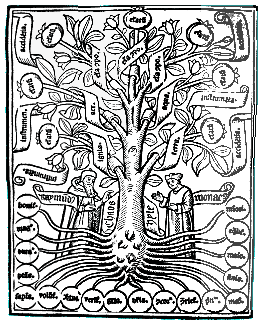Daniel Potter
3.21.96


I attempt in this presentation to locate what might be considered *aberrations* of documentary film form and practice. To initiate this move outside of traditional documentary forms, production, and scholarship, I look toward dual historical horizons -- back to the days of rhetorical invention and the art of memory, and forward into emerging realms of digital archives, distributed media, and spectator-side authorship. First I will set out several issues that have intrigued and plagued the theoretical scholarship on documentary film; from there, I will sketch the connection of essay film to the art of memory, and finally look at the notion and evolving reality of digital audio-visual archives that signal the advent of new media forms. Of special interest will be the archival or compilation film as it moves into multimedia authoring scenarios.


Aberrant Genres
* The specter of objectivity: documentary norms and their
aberrations
* Subject-object reversals
* Multiple voiced documentary: Trinh T. Minh-ha, Naked Spaces
* Cinéma-vérité as the truth of cinema
* Reverse Ethnography: Jean Rouch, Les Maîtres Fous
* Native Informants and knowledge-power relations in ethnographic film
* Spectator-end authorship
* Media recycling and culture jamming
* The essay-collage: Craig Baldwin, Sonic Outlaws
* Collaborative cinema: Loin de Vietnam and Deutschland im
Herbst
* The Loss of referentiality: Bill Nichol's concept of "performative
documentary" (Blurred Boundaries, 1995)
* Thresholds of evidence and proof
* The emblem tradition: image-text relations
* Rhetorical origins of the essay form in Montaigne
* Self-portrait video: the work of Raymond Bellour
Rhetoric and Mnemosynesthesia
* Rhetorical loci
* Commonplaces
* Architectural method of memory arts
* Placement of images
* Memory theaters
* Cosmic dimensions of mnemonics
* Camera as inscriptive device for artificial memory
* Self-portrait as anti-rhetorical move: Montaigne
* Michel Beaujour, Poetics of the Literary Self-Portrait
* Ramon Llull
* Giordano Bruno and magical memory
* Combinatoire methods
* Internet/web as combinatoire
* Art of memory as an authoring environment
* The Aleatory
* New anonymity/new middle ages
* Placement of images in Chris Marker, Sans Soleil
Archive
Genre Evolution
* The Unconscious as archive
* Synesthetic archives: future libraries
* EBN: television as collective imaginary
* The dominance of the visual since the advent of printing
* The Web as memory palace
* Compilation film/ archival film: writing history with film
* Montage in archival or compilation film
* The "toxic film artefact": Sharon Sandowsky's argument
* Unfinished Media (Brian Eno)
* Haddon project: online ethnographic film archive
* Image archives and future libraries
Videothèque de Paris
Osaka ethnographic film archive
Bibliothèque de France
* Derealization
* Recycling
* Navigational paradigms
non-linearity / descriptors / narrative paths
* Glorianna Davenport and Media Lab Interactive Cinema projects:
"the evolving documentary"
* Media Streams: annotation, icon-based sharable time-based media
notation
"global media archive"
* Sha Xin Wei, "Scholarly Spaces 1996"
* Voyager "I" series: transformation of the video self-portrait tradition
* The WWW as research landscape
* Book paradigm: From camera-style to computer-stylo (Astruc etc.)
* Dissertations on CD-ROM
* Alan Lomax' Global Jukebox
* Machine as auteur
* "Sieht es zurück": the sentient object and the paranoid subject
* Evolution of the emblem tradition
* Hardware and software issues: specs for a multimedia documentary tool
* Weighted descriptors and navigational paradigms